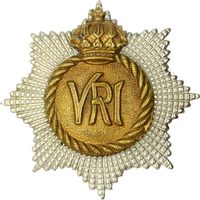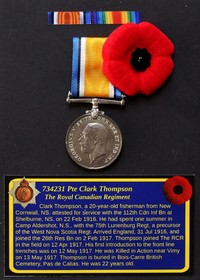
734231 Private Clark D. Thompson
112th Overseas Battalion
The Royal Canadian Regiment
By: Capt (ret'd) Michael M. O'Leary, CD, The RCR
Clark D. Thompson was born in New Cornwall, Lunenburg County, Nova Scotia, on 14 Nov 1895. The Thompson family can be found in the 1901 Canadian Census. Parents Parker "Wedall" (Absalom) (30) and Laura (nee Ernst, 27) have three children, Alberta Mae (7), Clark D. (6), and Norman Parker (2). Father Weddal's trade is shown in the census records as Farmer.
By the time of the 1911 Canadian Census, the family had grown. Wedall (30) and Laura (27) have five children at home; Alberta (18), Clark D. (16), Norman (12), Elsie (3) and Ray Theodore (1). (One sibling died in early childhood in 1905, and two more would join the family, born in 1912 and 1914.)
Thompson attested for service in the Canadian Expeditionary Force (C.E.F.) with the 112th Overseas Battalion at Shelburne, Nova Scotia, on 22 Feb 1916. A 20-year-old fisherman, Thompson was described on his attestation paper as 5 feet 9 1/2 inches tall, weighing 145 pounds, with a 37-inch chest, a dark complexion, brown eyes, and black hair. His religious denomination was Lutheran. Thompson identified his mother, Mrs. Wedall Thompson, as his next of kin. On attesting with the 112th Battalion, Thompson was given the regimental number 734231.
For prior service, Thompson claimed that he had spent one summer at Camp Aldershot, N.S. with the 75th Regiment. The 75th Regiment was formed in 1870 at Lunenburg, N.S. and by 1900 would be known as the 75th Lunenburg Regiment. Through later amalgamation it has become one of the regiments which formed the West Nova Scotia Regiment.
The 112th Battalion (Nova Scotia), C.E.F., was recruited throughout Nova Scotia and was mobilized at Windsor, N.S. The battalion was authorized on 22 Dec 1915 and embarked for Great Britain on 23 Jul 1916. It provided reinforcements for the Canadian Corps in the field until 7 Jan 1917, at which time its remaining personnel were absorbed by the 26th Reserve Battalion, C.E.F.
Clark Thompson's younger brother, Norman Parker Thompson (#733849), also enlisted for service with the 112th Battalion. The two men would reach France together and both be posted to The Royal Canadian Regiment as reinforcements.
With the 112th Battalion, Thompson sailed from Halifax aboard the S.S. Olympic on 23 Jul 1916. The unit disembarked England at Liverpool on 31 Jul 1916.
Commencing August, 1916, Thompson established a monthly Pay Assignment of $15 to be sent to his mother. As a Private in the C.E.F., Thompson was paid $1.00 per day plus an additional ten cents daily field allowance. His pay assignment represented about one-half of his monthly pay.
On 2 Oct 1916, Thompson completed the brief Military Will form in his soldier's paybook. In this will, he stated: "In the event of my death I give the whole of my property and effects to my mother, Mrs. Weddal Thompson, Middle Cornwall, Lunenburg County. Nova Scotia, Canada."
After over six months in England, Thompson was transferred to the 26th Reserve Battalion at Bramshott on 2 Feb 1917. This unit was part of the reinforcement system which was starting to reorganize on regional lines. Designated the 26th Canadian Reserve Battalion (Nova Scotia), it was initially formed with soldiers from the 40th, 112th, and 218th Battalions, and RCR designated reinforcements from the RCR & PPCLI Depot. The 26th Res. Bn. existed at Shorncliffe from 4 Jan 1917 to 15 Oct 1917.
A month after he joined the 26th Res. Bn., Thompson proceeded Overseas for service with R.C.R. On 6 Mar 1917, he landed in France and was taken on the strength of the Regiment while reminwing at the Canadian Base Depot (C.B.D.) at Le Havre.
Thompson's forward movement to join the Regiment in the field began on 31 Mar 1917 when he left the C.B.D. for the 3rd Entrenching Battalion. This Divisional troops unit was employed as a ready labour force and by design its troops were a forward reserve of reinforcements for the division's fighting battalions. They were used as labour forces to maintain and build trenches or other work as needed. The 3rd Canadian Entr. Bn. was organized at the Canadian Base Depot in July 1916 and was disbanded in September 1917 on formation of Canadian Corps Reinforcement Camp.
Arriving at the 3rd Entr. Bn. on 3 Apr 1917, Thompson would wait until 12 Apr 1917 before he joined The RCR in the field. The Regiment's War Diary describes the Regiment's activities on the day Thompson arrived as part of a large draft of reinforcements making up some of the losses from the recent battle of Vimy Ridge:
"12.4.17. – VILLERS CAMP. "Cloudy with heavy snow fall in early morning. Brighter in afternoon. Regiment spent day resting. Check Roll Call at 2 p.m. Party sent up to Salvage Greatcoats which were brought down by Transport. Draft of 168 O.R. arrive as reinforcements."
The activities of The RCR in the month after Thompson's arrival at the unit are summarized in the unit's "Battle Bar Document" (prepared after the war by the Militia Department in anticipation of the possibility of clasps for the British War Medal).
- 11 Apr 1917 – 6.15 p.m.; Relieved by 58th Bn and moved to VILLERS-AU-BOIS.
- 16 Apr 1917 – Moved to billets in neighbourhood of QUARRIES LINE.
- 18 Apr 1917 – Bn moved to FORT GEORGE, working on roads till 24th.
- 24 Apr 1917 – Noon; Relieved 1st CMR Bn in Bde Res (4th & 5th lines of resistance) supplying working parties on roads, burying cable and salvaging equipment till 30th.
- 30 Apr 1917 – Relieved by 58th Bn and moved to QUARRIES LINE.
- 1 May 1917 – To VILLERS-AU-BOIS. Resting.
- 7 May 1917 – To GRANGE TUNNEL. Supply working parties on roads, etc., till 11th.
After a month in billets, on working parties, and at rest, Thompson's first introduction to the front line trenches would not come until 12 May 1917 when, late that night, The RCR relieved the 4th Battalion, Canadian Mounted Rifles (C.M.R.) in the front line southeast of Neuve Chapelle. On occupying their new positions, all available men were put to work deepening and improving trenches.
Thompson's experience of the forward trenches was brief. On 13 May 1917, he was killed in action. The War Diary note for that day, showing two companies of the PPCLI under command of The RCR, is as follows:
"13.5.17. – VIMY.
"Fine and Very Warm. Relief commenced last night completed at 1.30 a.m. Line is now held as follows:— from Right to Left (Map References, Sheet 36c.S.W.)
- No. 3 Co. P.P.C.L.I. T.17.d.1.8. to T.16.b.4.1
- No. 4 Co. P.P.C.L.I. Support. T.16.b.9.1. to T.16.c.8.6.
- "A" Co. R.C.R. T.16.c.8.6 to T.15.b.3.3.
- "B" Co. R.C.R. T.15.b.3.3. to T.9.c.5.8.
- 2 Platoons "C" Co. T.9.c.5.8. to T.9.c.0.5.
- 1 Platoon "C" Co. in Support. In Trench from T.15.d.5.4. to T.14.b.9.6.
- "B" and "D" Cos. In supports. From T.20.b.2.6. to T.19.c.8.2.
- Battalion Headquarters is situated in Old German Gun Emplacement in Railway Embankment at T.19.b.8.6.
"Our Front Line is approximately 1400 yards from the enemy lines. The Enemy shelled Battalion Headquarters and vicinity from about 8.00 a.m. to about 6.00 p.m. quite heavily from 2.00 p.m. on. Offensive and Defensive Patrols were out on all Company Fronts during the night. "B" Co. Patrol under Sergeant ORR captured a prisoner of the 93rd R.I.R. 4TH Guards Division about T.9.d.5.7. near one of our Lewis Gun Posts, he was on a Patrol of ten of the enemy and had been sent back by the Officer in charge to bring up Rear Party, none of the remainder of the Patrol were seen, all Companies are working on the deepening and widening of the trenches and "D" Company are digging a communication trench to Front Line and also building Dugouts in Support Line. Wire is to be put out by all Companies not less than 75 yards in advance of the Front Line and zig-zagged. There are numerous well-filled Dumps of German Concertina Wire in our Area which we intend to use also we can salvage numbers of German Screw Stakes, medium and small. We are to have 2 Platoons of No. 1 Company P.P.C.L.I. each night for Carrying Party.
"13 O.R. joined as reinforcements from C.B.D. "3 O.R. killed in action. "3 O.R. Evac. to C.C.S."
Thompson was given a battlefield burial near where he fell. After the War, on 23 Jun 1919, his remains were moved to Bois-Carre British Military Cemetery at Thelus, France. There is an entry in the Commonwealth War Grave Commission Cemetery Register for Thompson. It reads:
"THOMPSON, Pte. C. D., 734231. Royal Canadian Regt. 13th May 1917. Age 22. Son of Wedall and Laura Thompson, of Middle Cornwall, Lunenburg County, Nova Scotia, Canada. VI. A. 19."
There are twelve Royal Canadians in Bois-Carre Cemetery, including the three killed in action on 13 May 1917:
- 439023 Pte Oswald Seton HULLIN, 13-May-17
- 261717 Pte Mike NOVIK; 13-May-17
- 734231 Pte Clark THOMPSON; 13-May-17
For his service in the C.E.F., Thompson was entitled to receive the British War Medal and the Victory Medal. These were despatched to his parents at New Cornwall, N.S., on 7 Sep 1920. The Thompsons would also receive the Memorial Plaque and Scroll, and his mother would also receive a silver Memorial Cross. The plaque and cross would be despatched in 1921.
Pro Patria
Visit a randomly selected page in The O'Leary Collection (or reload for another choice):
- The O'Leary Collection; Medals of The Royal Canadian Regiment.
- Researching Canadian Soldiers of the First World War
- Researching The Royal Canadian Regiment
- The RCR in the First World War
- Badges of The RCR
- The Senior Subaltern
- The Minute Book (blog)
- Rogue Papers
- Tactical Primers
- The Regimental Library
- Battle Honours
- Perpetuation of the CEF
- A Miscellany
- Quotes
- The Frontenac Times
- Site Map
QUICK LINKS
The O'Leary Collection—Medals of The Royal Canadian Regiment
Newest additions:
![]()
![]() SB-12725 Private Henry "Hank" Ard
SB-12725 Private Henry "Hank" Ard ![]()
WIA at Hill 187, Died of Wounds in Japan
![]()
![]() 2355331 Lance Corporal Albert Lorking
2355331 Lance Corporal Albert Lorking
Wounded in action, later a War Amps representative.
![]()
![]() 4334 / 477996 Pte Isaac Hamilton Wilcox
4334 / 477996 Pte Isaac Hamilton Wilcox
Permanent Force, South Africa, and C.E.F.
![]()
![]() 477019 Private Harold Ashcroft
477019 Private Harold Ashcroft
Transferred to the Tunnelers.
![]()
![]() 734231 Private Clark D. Thompson
734231 Private Clark D. Thompson ![]()
The older Thompson brother, killed in action.
![]()
![]() 733849 Private Norman Parker Thompson
733849 Private Norman Parker Thompson
The younger Thompson brother; post-war service in the Special Guard.
![]()
![]()
![]() A305 / 400305 Private Andrew Walker
A305 / 400305 Private Andrew Walker ![]()
"Previously reported Wounded, now Killed in Action."
![]()
![]() 823298 Pte Thomas Patrick Steele, M.M.
823298 Pte Thomas Patrick Steele, M.M. ![]()
… for gallant conduct in the field …
![]()
![]() P13066 Sergeant Harold Thompson
P13066 Sergeant Harold Thompson
Instrumental Soloist for over 20 years of Canadian Army service.
![]()
![]() 9609 / 477728 Private Albert Edward Piper
9609 / 477728 Private Albert Edward Piper
"Arrived from England as a STOWAWAY …"


